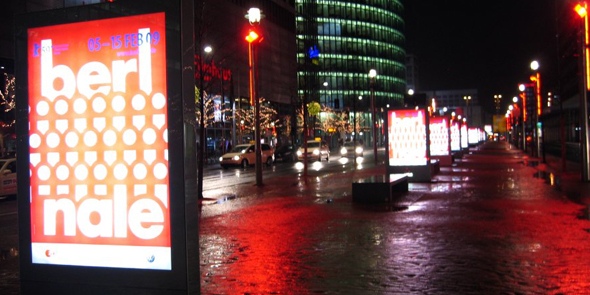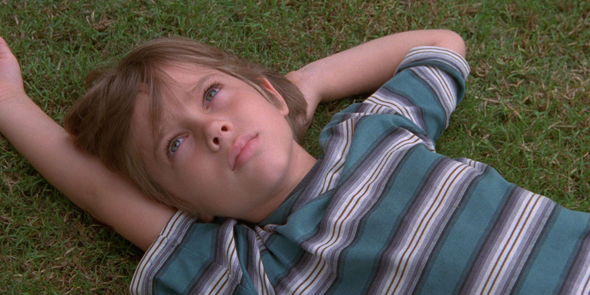For devoted cinephiles there is only one place to be at this time of the year: Berlin. In early February the city plays host to the Berlin International Film Festival, the world’s largest publicly attended film festival.
 Festival time | Photo: Blogging Dagger via Flickr
Festival time | Photo: Blogging Dagger via Flickr
Also known as the Berlinale, the festival was founded in 1951 by American Oscar Martay, who also founded the Cannes. It has since grown to be one of the world’s most prestigious film festivals.
Annually showcasing around 400 movies from over 130 countries in seven different sections and attracting around 300,000 moviegoers, the Berlinale is also the most lucrative event of the film industry calendar.
While all seven sections of Berlinale feature films by established filmmakers, films entered for competition attract the most attention and their success or failure can make or break careers. Films entered for competition vie against each other for the prestigious Golden Bear award, given to the best film, and for various Silver Bear awards for best director, actor, actress, screenplay and short movie.
Other sections of the festival include the panorama, section which showcases thought-provoking feature-length movies, the forum section for experimental film and documentary, Berlinale shorts, perspektive deutsches kino for German films, and the retrospective section for classic films previously shown at Berlin. In addition to these more-or-less standard film festival categories, Berlinale has its own idiosyncratic (and wildly popular) section called generation that comprises both short and feature-length films that are aimed at children and young adults.
The eclectic Jury of Berlinale 2014, which starts on February 7, includes many big names of art house cinema, as well as Oscar-winning Hollywood stars, such as actor Christoph Waltz (Inglorious Bastards and Carnage), Hong Kong actor Tony Leung (Chungking Express and 2046), Indie sweetheart Greta Gerwig (Frances Ha and To Rome With Love), director Michel Gondry (Eternal Sunshine of the Spotless Mind), Iranian documentary-filmmaker Mitra Faharani, Danish actress Trine Dyrholm (Festen), producer Barbara Broccoli (Skyfall and Casino Royale) and producer/screenwriter Jim Schamus (Brokeback Mountain and The Ice Storm ).

Filmmakers compete for the Golden Bear award | Photo: Allison Meier via Flickr
From cinéma vérité-esque coming-of-age stories to gut-wrenching WWII dramas to graphic explorations of nymphomania, this year’s ambitious selection of competition films have something for everyone. While the opening film of the festival, Wes Anderson’s (The Royal Tenenbaums and Rushmore) whimsical The Grand Budapest Hotel, is sure to please his hipper-than-thou following, the most talked about film of this year is Nymphomaniac, the latest offering from European Cinemas enfant terribleLars Von Trier (Dogville, Dancer in the Dark, Antichrist). Starring sensational French actor Charlotte Gainsbourg (daughter of the iconoclastic singer Serge Gainsbourg), Nymphomaniac is an intense but honest depiction of a female sex addict and her relationship with the man who saved her from a savage beating. Von Trier, who last year was declared persona non grata at Cannes Film Festival after comments at a press Canne conference where he appeared to sympathise with Adolf Hitler, is sure to anger, frustrate, and delight many critics and alike at this year’s Berlinale.
Another highlight of this year’s festival is the latest from indie auteur Richard Linklater (Before Midnight, Dazed and Confused): his long-waited bildungsroman Boyhood. Shot over a twelve-year period, this tight Bergmanian drama closely follows a family-of-four as they fail and triumph over everyday difficulties over the years. Shown from the perspective of the youngest member of the family – an elusive seven-year-old boy, and shot in real time to succinctly capture all the subtleties of an introverted boy metamorphosing into his own man, Boyhood is perhaps the most realistic and contemplative coming-of-age film to ever hit the silver screen.
American director Ira Sachs, whose last film Keep the Lights On won the Teddy Award at last year’s Berlin Film Festival, returns to Berlinale with an equally haunting and graceful drama; Love is Strange. This politically-charged and intimate movie resolves around an elderly gay couple (played by John Lithgow and Alfred Molina) who are forced to live apart for the first time after 39 years together after their recent marriage gets one of them fired from his job as a Catholic School teacher. Looks like with this timely tearjerker, Sachs is once again gunning for the prestigious Teddy Award given to the most accomplished LGBT-themed movie.
Iconoclastic South Korean director Joon-ho Bong, who is responsible for genre-bending masterpieces such as the hyper-real monster-flick The Host and the stylish psycho-thriller Mother, is another returning Berlinale veteran. His new film, Snowpiercer, which was only very recently added to the forum section of the festival, is an apocalyptic thriller about a ragtag group of end-of-the-world survivors who are stuck circling the earth on a non-stop train ride while the outside world faces a second Ice Age. Featuring a stellar international cast that includes names such as Tilda Swinton, John Hurt and Chris Evans, this dystopian (and apparently quite violent) sci-fi epic is literally the most explosive title of this year’s festival.
 A scene from Boyhood, the new Richard Linklater movie | Photo: Zentropa
A scene from Boyhood, the new Richard Linklater movie | Photo: Zentropa
If this diverse list of films is not enough to get you jumping up-and-down like a toddler on a sugar rush; Is the man who is Tall Happy?, visual-magician Michel Gondry’s psychedelic animated documentary about the famous MIT linguist Noam Chomsky will guarantee to do just that. There is also God Help the Girl, the new musical by Scott Murdoch – the leader of Scottish indie-pop band Belle and Sebastian, which is the opening film of the Berlinale’s generation section. And, there is the Carnegie Prize winner Turkish Conceptual-artist Kutlug Ataman’s highly-anticipated new drama, The Lamb. The details of this movie are hush-hush but shot entirely in a remote village in Turkey with unknown child actors, like all the other Ataman films, The Lamb promises to be a poetic slap in the face that boldly criticizes the cultural and economical inequalities of the Middle East.
As we anxiously wait for the Golden and Silver Bear Awards to be announced for the 64th time, Berlin’s winter cold will disappear, and thousands of lucky cinephiles will escape into hundreds of kaleidoscopic worlds in the dark theaters of Alexanderplatz. Exclusive red-carpet screenings and debaucherous parties will take place. Icy Beer will be served. Extra-buttery Popcorn will be eaten. And, once again, celluloid magic will blanket Berlin.